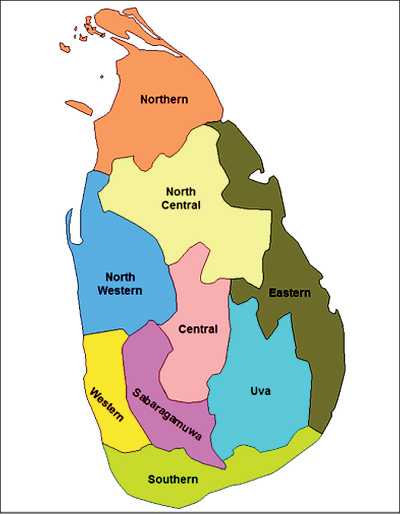Monday Feb 16, 2026
Monday Feb 16, 2026
Thursday, 27 August 2020 00:00 - - {{hitsCtrl.values.hits}}
 The objective of this write up is to focus the attention of the Government, particularly those closely linked to the subject of Local Government. The ministry, however, is now covering a wide spectrum of subjects outside the local government ambit extending to pensions – official languages, human resource development, language education, etc. the assigned functions. (Ministry of Public Services, Provincial Council and Local Government).
The objective of this write up is to focus the attention of the Government, particularly those closely linked to the subject of Local Government. The ministry, however, is now covering a wide spectrum of subjects outside the local government ambit extending to pensions – official languages, human resource development, language education, etc. the assigned functions. (Ministry of Public Services, Provincial Council and Local Government).
Local Government is a field where major developments have been effected periodically oriented towards a decentralised administration. Nevertheless it remains an area of great contempt and dis-satisfaction which has even led to an up rise of separatism demanding worst extremes beyond democratic decentralisation. Hence the subject of Local Government whether provincial or divisional continues to remain a matter of contention. In its latest manifestation the statement made by the Minister of State in charge of Provincial Councils and Local Government about the Land alienation powers and Police powers of the PCs further high light the existing discrepancies in the system.
The Local Government system has evolved to the present stage over a period of time. It is necessary to examine the stages of its development to consider any improvements in the system.
Starting with the monarchial system of government that prevailed during periods going back to the 3rd and 4th Centuries BC, the bureaucratic administration kept on evolving. Early hierarchical system operating with the monarchical authority through a district structure extended to the villages enforcing functional services assigned to different groups divided on caste basis. With the foreign invasions the administration systems too underwent changes according to the needs of the rulers.
The Sri Lankan Local Administration began to change drastically with the establishment of the British ‘Crown Colony’ status after the entire country came under one foreign rule. The first step towards the association of locals in the administration of the government came about influenced by the Colebrooke-Cameron Commission in 19th Century which recommended the appointment of non-officials to the administrative machinery following the establishment of the Legislative Council. The bureaucratic nature of the administration however continued with minor changes taking place from time to time until the Donoughmore Period (1931-1946). Reforms effected during this era were in keeping with the public cry for an equitable control over and a fair share of their participation in the local affairs.
A Commission appointed in response to the public demand in 1916 had recommended the introduction of Local Government Ordinance No.11 in 1920. This move paved the way to establish 3 types of district council systems covering the Urban, Rural and General to be adopted according to their suitability for the areas, throughout the country. When the Donoughmore Commission was appointed Municipalities of Colombo, Kandy and Galle were in existence in addition to Sanitary Boards and Village Committee’s which reflected some degree of power sharing beyond the ex-officio administration prevailed before.
The most significant development in the Local Government under the Donoughmore Constitution was the recognition of the principle of ‘Decentralisation of Government upon elected or partially elected bodies created for the purpose’.
Accordingly the Minister of Local Government in the State Council amended the then existing provisions in the Ordinances bringing about reforms to replace the official members in the Village Committees by elected members. The Local Government bodies became corporate bodies with wide powers to levy taxes and incur expenditures while controlling the areas such as health, road construction, water supply, markets and fairs under laws formed by them for such purposes.
The introduction of the Town Councils, Urban Councils and Municipal Councils followed to be governed fully under elected representatives on extended franchise rights. This was the beginning of the elimination of bureaucratic officials to be replaced by elected members.
Some of the basic factors that were taken into account in the devolution of power were:
i. The need to allow the people of the area to gain control over the needs of the areas freeing the activities from the control of the centre.
ii. To effectively implement schemes relieving the Central Government Depts. by freely taking decisions at the local level.
iii. To take the responsibility for public matters on a political basis.
iv. The local administration to be effected embracing different views of the people of the area.
S.W.R.D. Bandaranaike as the then Minister of Local Government in the State Council stated his views about these reforms as follows: “The local bodies would be enabled to have the services in a good many matters that are now services performed by the Central Government carried out more efficiently and cheaply and more in accord with the wishes of the people.”
This short account of the history of evolution of the Local Government systems in this country pose several questions before us, in the today’s context. Have we reached the pinnacle of the process in the development of Local Government system?
Is the prevailing system continued to functioning fulfilling the aspirations of the people in their participatory role in managing the public affairs concerning the issues in their areas?
Have they merely ended up in electing a set of local politicians who cannot be held responsible for their actions and non-actions?
When we trace the evolution of the Local Government system to its present stage, certain important milestones in its history become important to be re-examined. The “Choksy Commission” of 1955 is an important land mark, which inter-alia made far reaching proposals regarding decentralisation of many functions that remained confined to Government Depts. There was a major focus on the powers and functions of the Local Bodies and the limitations based on the Governing Ordinances.
In particular reference has been made to the need to integrate the development function with the on-going Rural Development in existence. The underlying principle according to a UN Study which identified the issues as it then existed was “Community Development is the process by which the efforts of the people themselves are united with those of governmental authorities to improve the economic social and cultural conditions of communities, to integrate them into the life of the nation and to enable them to contribute to national progress”.
In 1970 the departments of Rural Development and Local Government came within the Ministry of Public Administration Local Government and Home Affairs. In 1975 while the former remained in the Ministry of Public Administration and Home Affairs, the latter was placed within a separate Ministry of Local Government. As of today, the need has arisen to re-address these factors and create a more advanced Local Government system.
There are several over-lapping areas with regard to power-sharing responsibly and Central Government control.
Time has come to pay more attention to the rural and district development work legging behind compared to the urban face lift programs now in progress.
Especially when the public attention remains focused on constitutional changes, the area of local government system is one sector that should be fully addressed to make it more modern and meaningfully effective.
Before concluding I would like to refer to certain statements and remarks made by late S.W.R.D. when he was the Minister of Local Government to serve as food for thought. His address to the Annual Conference of the Association of Urban Councils and at the All Ceylon Village Committee Conference in December 1943 and several other public presentations, deserve to be closely examined in the current context of ‘Our war is only just beginning’ as spelled out in the address he made at the Annual Session of All Ceylon Village Committee Conference held on 22 December -1945. In addressing any improvements to the Local Government system in the context of a proper democratic decentralisation, several factors have to be taken into consideration, such as social, political cultural and sociological, the traditional administrative system that have undergone changes and more importantly the need for rapid and sustained development in all areas parallel to the macro-development in the urban sector. Local Government systems can no doubt be pivotal in bringing about these changes.